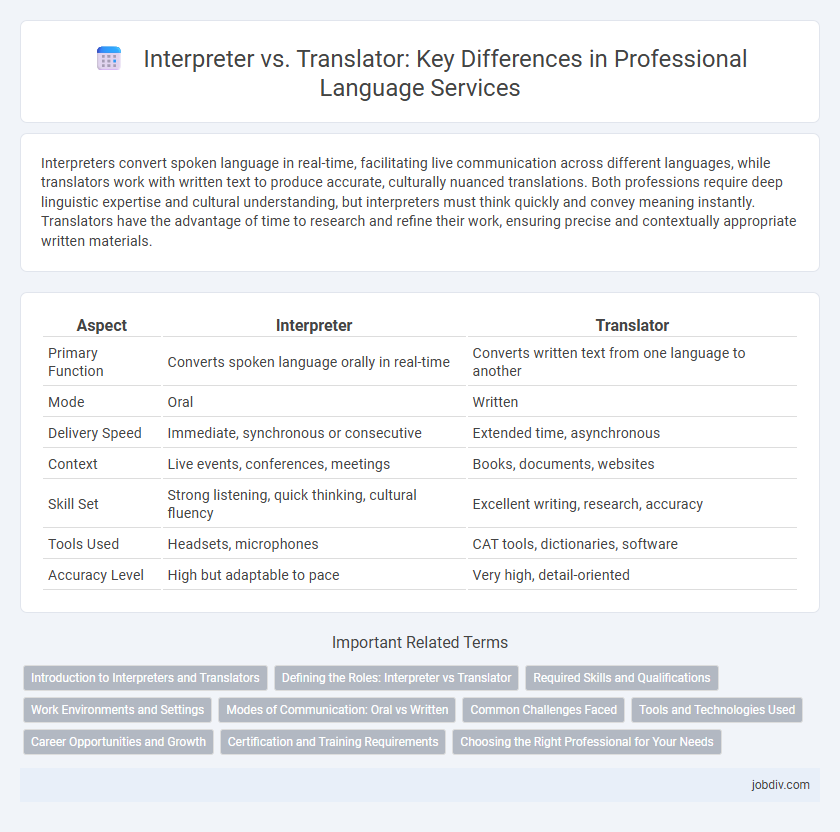Interpreters convert spoken language in real-time, facilitating live communication across different languages, while translators work with written text to produce accurate, culturally nuanced translations. Both professions require deep linguistic expertise and cultural understanding, but interpreters must think quickly and convey meaning instantly. Translators have the advantage of time to research and refine their work, ensuring precise and contextually appropriate written materials.
Table of Comparison
| Aspect | Interpreter | Translator |
|---|---|---|
| Primary Function | Converts spoken language orally in real-time | Converts written text from one language to another |
| Mode | Oral | Written |
| Delivery Speed | Immediate, synchronous or consecutive | Extended time, asynchronous |
| Context | Live events, conferences, meetings | Books, documents, websites |
| Skill Set | Strong listening, quick thinking, cultural fluency | Excellent writing, research, accuracy |
| Tools Used | Headsets, microphones | CAT tools, dictionaries, software |
| Accuracy Level | High but adaptable to pace | Very high, detail-oriented |
Introduction to Interpreters and Translators
Interpreters convert spoken language in real-time, facilitating immediate communication across different languages during conversations, meetings, or conferences. Translators specialize in written content, accurately rendering texts from one language into another while preserving meaning, style, and context. Both roles require deep linguistic expertise, cultural knowledge, and subject matter proficiency to bridge communication gaps effectively.
Defining the Roles: Interpreter vs Translator
Interpreters convert spoken language in real-time during conversations, conferences, or live events, ensuring immediate oral communication across languages. Translators work with written texts, converting documents, books, or digital content from one language to another with attention to context, accuracy, and cultural nuances. Both roles require deep linguistic knowledge, but interpreters emphasize oral fluency and quick thinking, while translators focus on precision and text structure.
Required Skills and Qualifications
Interpreters require exceptional listening abilities, quick thinking, and strong verbal communication skills to facilitate real-time dialogue across languages. Translators must possess excellent reading comprehension, writing proficiency, and attention to detail to accurately convert written texts while preserving meaning. Both professions typically demand fluency in at least two languages, cultural knowledge, and relevant certifications such as ATA for translators or certification from organizations like the National Association of Judiciary Interpreters and Translators (NAJIT) for interpreters.
Work Environments and Settings
Interpreters work primarily in real-time environments such as conferences, courtrooms, and medical appointments, requiring immediate verbal translation to facilitate live communication. Translators operate in office or remote settings, focusing on converting written documents, websites, and manuals with attention to accuracy and context. Both professions demand specialized language skills but differ significantly in their interaction style and work conditions.
Modes of Communication: Oral vs Written
Interpreters specialize in oral communication, facilitating real-time spoken language exchange in settings such as conferences, meetings, and live broadcasts. Translators focus on written communication, converting documents, books, and digital content accurately across languages while preserving context and terminology. The core distinction lies in immediacy and medium: interpreting requires instantaneous verbal processing, whereas translation demands meticulous written text adaptation.
Common Challenges Faced
Interpreters often encounter challenges such as real-time language processing, cultural nuances, and maintaining accuracy under pressure. Translators face difficulties with idiomatic expressions, context preservation, and ensuring textual consistency across different languages. Both professions require deep linguistic expertise and subject-matter knowledge to overcome the complexities of effective cross-cultural communication.
Tools and Technologies Used
Interpreters primarily rely on advanced digital audio equipment, real-time speech recognition software, and remote video conferencing platforms to facilitate seamless communication across languages. Translators utilize computer-assisted translation (CAT) tools, terminology management systems, and machine translation engines to ensure accuracy and efficiency in written content. Both professions increasingly adopt artificial intelligence and cloud-based solutions to enhance productivity and maintain high-quality language services.
Career Opportunities and Growth
Career opportunities for interpreters often involve live settings such as conferences, legal proceedings, and medical appointments, requiring quick thinking and strong verbal communication skills. Translators focus on converting written text across languages, offering growth in publishing, localization, and specialized industries like legal or technical documentation. Both professions show increasing demand due to global business expansion and technological advancements in language services.
Certification and Training Requirements
Interpreter certification often demands rigorous practical assessments and specialized training in oral language proficiency and real-time communication skills, while translator certification emphasizes written language accuracy, industry-specific terminology, and mastery of translation software. Accredited programs like the American Translators Association (ATA) for translators and the Certification Commission for Healthcare Interpreters (CCHI) for interpreters provide widely recognized credentials that validate expertise and professional standards. Ongoing education and continuous skill development remain crucial for both fields to maintain certification and adapt to evolving linguistic and technological advancements.
Choosing the Right Professional for Your Needs
Interpreters specialize in real-time oral communication, making them ideal for meetings, conferences, and live events, whereas translators focus on converting written documents with precision and cultural accuracy. Choosing the right professional depends on whether you require immediate verbal interaction or meticulously translated text tailored to specific industry terminology. Ensuring the expert aligns with your project's format and subject matter enhances communication effectiveness and project success.
Interpreter vs Translator Infographic

 jobdiv.com
jobdiv.com